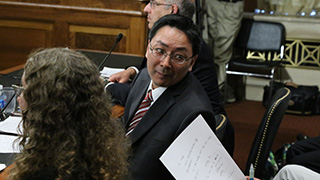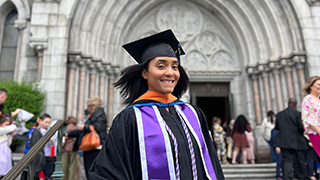Global Health Expert Discusses Ongoing Impact of COVID-19 Pandemic - Seton Hall University
Friday, June 19, 2020

In June, his media coverage results in more than 100 clips with an earned media value of over $60,000 and a total online circulation of more than 2 million in outlets including CNBC, Bloomberg News, International Business Times, The New York Times, South China Morning Post, International Business Times and London Free Press.
Looking at U.S. states throughout the nation that are experiencing a rise in COVID-19 cases, and specifically an analysis of Texas coronavirus hospitalizations hitting a new high, Huang told CNBC, "Before a vaccine becomes widely available, we can only hope that ... the pathogen becomes less virulent and people come to treat it like seasonal influenza."
Huang spoke to Bloomberg News on the decision by Beijing to shut schools as it tries to half a new coronavirus outbreak spreading to neighboring provinces. He discussed how high the costs of a complete shutdown would be in a population as large of Beijing compared to the earlier shutdown of Wuhan. "A city-wide lockdown in Beijing would not only reverse the process of economic and social reopening, a key policy objective of the party, but also undermine considerably the government’s own narrative on the success of its anti COVID-19 campaign," Huang said. "The social, economic, and political pain might be way too high to justify a city-wide lockdown."
When discussing the situation with The New York Times, he said that while the number of cases in Beijing are still small "this is in Beijing, the political and economic center, and so it has this symbolic meaning."
In an opinion piece in the South China Morning Post on how coronavirus is poisoning US-China relations, Huang described how the pandemic has rekindled conspiracy theories, renewed criticism and hostility, and left an American leadership void for China to fill, while inflicting greater economic damage on the US. He writes: "State and official media outlets in China are saturated with comments and posts that portray the US as a diminishing and hostile power. In the US, a recent Pew survey suggests that roughly two-thirds of respondents have an unfavorable view of China, up nearly 20 percentage points since 2017."
Journal of Global Health Governance.
Links to selected media coverage include:
- AFP: "Politics aside, US relies on China supplies to fight virus"
- BNN Bloomberg: "Beijing shuts schools to stem virus as cases spread beyond city"
- CNBC: "Texas coronavirus hospitalizations hit new high, up 66% since Memorial Day"
- CNBC:"Texas reports record-breaking coronavirus hospitalizations, the sixth new high in a week"
- CNBC: "Doctors have tips to reduce the risk of catching the coronavirus during George Floyd protests"
- International Business Times: "Beijing's failure to learn from Wuhan outbreak is alarming amid fears of second wave"
- Kaiser Family Foundation Daily Global Health Policy Report: "Blog Posts, Releases Address Various Aspects Of COVID-19 Pandemic"
- London Free Press: "From fighting Ebola to trying to wipe out polio, U.S. pullout from WHO will have tangible impact: experts"
- MSN News: "How coronavirus is poisoning US-China relations, one accusation at a time"
- The New York Times: "Beijing's Partial Lockdown a Sign of the World’s New Normal"
- South China Morning Post:"How coronavirus is poisoning US-China relations, one accusation at a time"
Categories: Education, Health and Medicine, Nation and World






